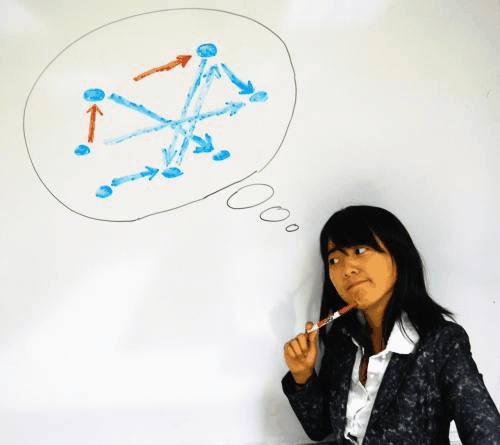Rong Rong 荣蓉
Ph.D. Candidate, Interdisciplinary Center for Economic Science,
George Mason University
Home Contact Research Teaching CV
 We human (animals and plants too!!)
live in an interconnected world and more so than ever before. I, like many
other social scientists,
am constantly amazed by how effective these
connections are at shaping our social and economic life. I spent most
of my time trying to understand the fundamental principles behind
social networks.
My academic quest, therefore, revolves around this theme as well.
We human (animals and plants too!!)
live in an interconnected world and more so than ever before. I, like many
other social scientists,
am constantly amazed by how effective these
connections are at shaping our social and economic life. I spent most
of my time trying to understand the fundamental principles behind
social networks.
My academic quest, therefore, revolves around this theme as well.
How
do social networks form? Which topology is stable under individual
rationality? When do they maximizes social efficiency? Why
some conditions in natural environments facilitates their emergence but some not? How could we utlize these conditions to help achieve better economic outcomes?
My current research uses laboraory experiments to address the above questions under a variety of incentive settings. In one study, I show that certain
institutional conditions, such as investment limits and the right of first refusal, promote the formation of efficient star networks . In another study, I show that social identity facilitates the formation of truth telling networks.
Finally,
I analyze these network data using cluster analysis to classify the
behavior of experimental participants. In particular, I develop a new
procedure to find the optimal penalty parameter in the classical
Calinski-Harabatz index.
Apart from network formation and network data analysis, I am generally
interested in using lab and field experiments to study individual
decision making in the context of markets, institutions and under a
variety of information conditions. My research are primarily in areas broadly defined as behavioral economics,
information economics, applied microeconomic theory and applied econometrics.
You can find out more about my current research projects and future academic plans in my research statement.
Dissertation Research:
Title: Endogenous Network Formation: Experiments and Methods
Committee: Daniel Houser (advisor), Tyler Cowen, Carlos Ramirez, Robert Axtell
Job Market Paper: "Growing Stars: A Laboratory Analysis of Network Formation", with Daniel Houser.
Summary:
The
acquisition and dispersion of information, a critical aspect of
economic decisions, can occur through a network of agents (Jackson,
2009). Empirical and theoretical findings suggest that an efficient
information dispersion network takes the form of a star: small numbers
of agents gather information and distribute it to a large group.
Despite these findings, controlled tests of this theory failed to find
evidence of the emergence of such networks with an exception of Goeree
et al (2008), which reports frequent star network formation with ex
ante heterogeneous agents and perfect information. Empirical evidence
suggests that these conditions may not always be feasible in natural
environments (Feick and Price, 1987; Conley and Udry, 2010). Complement
to earlier experimental research, we study institutional conditions
under which star networks emerge in the presence of ex ante homogeneous
agents. We find that investment limits and the
“right-of-first-refusal,” both of which regularly coexist with star
networks in natural environments, have a surprisingly strong ability to
promote the formation of star networks with ex ante homogeneous agents.
Using a cluster analysis, we trace the large positive effects of these
institutions to the impact they have on individuals’ behavioral rules.
In particular, we find that these institutions encourage individual
rationality as well as positive habits, which then lead to the frequent
and stable emergence of star networks. Our results may have important
implications for environments characterized by ex ante homogeneous
agents, e.g., those found in technology, marketing and agricultural
sectors.
Publication:
China Bashing: Does Trade Drive the 'Bad' News about China in the U.S.?,
with Carlos Ramirez, Review of International Economics, Vol. 20, Issue
2, pp. 350-363, 2012,
http://onlinelibrary.wiley.com/doi/10.1111/j.1467-9396.2012.01026.x/pdf
Research in Progress:
Cluster Analysis for Social Network Data, with Daniel Houser
Money or Friends?: Social Identity and Truth Telling in Social Networks, with Daniel Houser
Risk Attitudes and Job Contact Networks: Theory and Simulation, with Daniel Houser
Extreme
Paternalism: Theory and Lab Experiment on Strategic Information
Transmission with Bans and Requirements, with Robin Hanson
I’ll Be There: A Natural Field Experiment on Keeping and Breaking Promises, with Jared Barton


 We human (animals and plants too!!)
live in an interconnected world and more so than ever before. I, like many
other social scientists,
am constantly amazed by how effective these
connections are at shaping our social and economic life. I spent most
of my time trying to understand the fundamental principles behind
social networks.
My academic quest, therefore, revolves around this theme as well.
We human (animals and plants too!!)
live in an interconnected world and more so than ever before. I, like many
other social scientists,
am constantly amazed by how effective these
connections are at shaping our social and economic life. I spent most
of my time trying to understand the fundamental principles behind
social networks.
My academic quest, therefore, revolves around this theme as well.